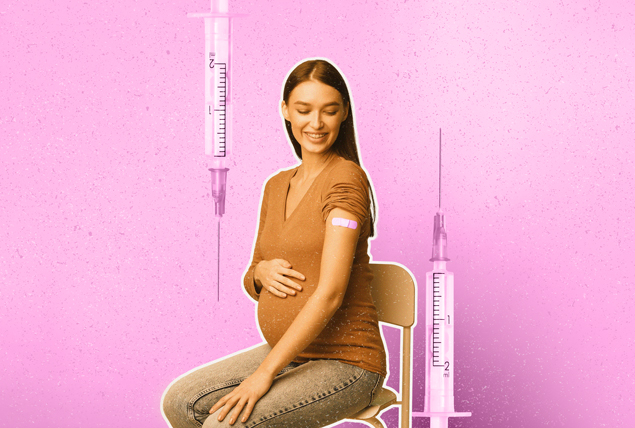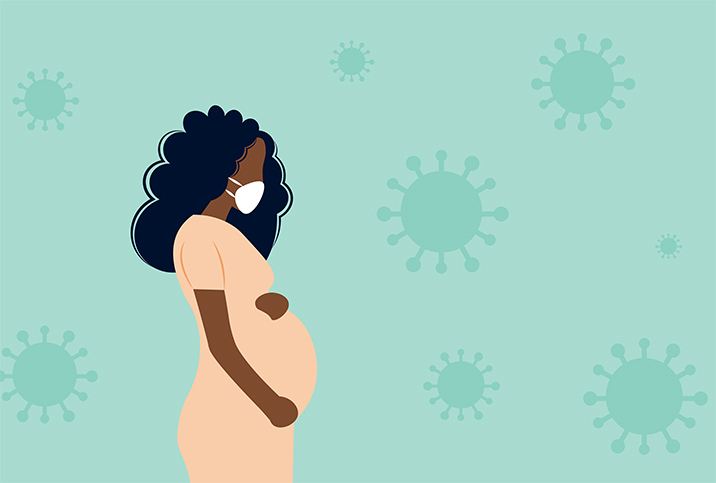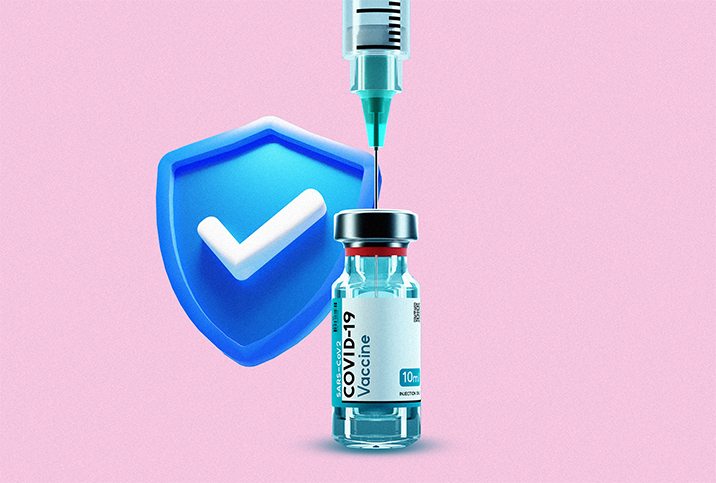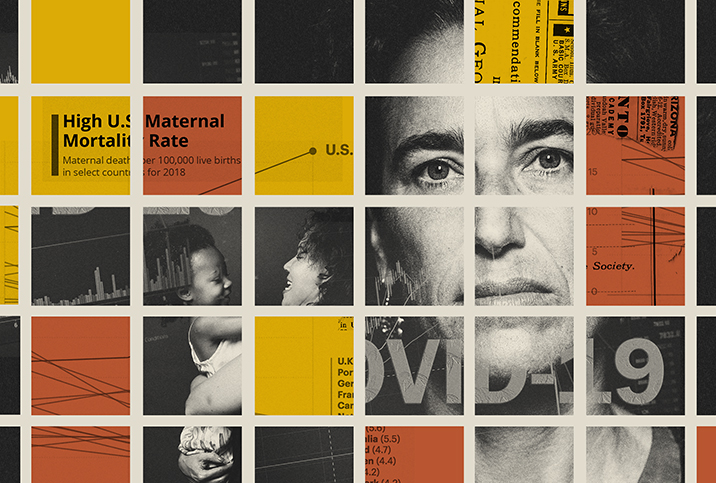COVID-19 Vaccines Are Still Important for Pregnant People and Babies

Key Points
- New research suggests that COVID-19 vaccines are still necessary during pregnancy. Maternal immunization can have lasting benefits for the mother and baby.
- The vaccine can protect against the virus's life-threatening and potentially long-term symptoms and help support a healthy pregnancy.
- Fetuses and newborns are less likely to contract the virus or suffer from symptoms if a pregnant mother receives a COVID-19 vaccine.
Three years after bringing the world to a halt, the COVID-19 virus has become a part of life for many people, fading into the background as an omnipresent but not impossible threat. That's largely thanks to vaccines, which have been proven safe and effective.
Yet some of society's most vulnerable—the people nearly four times as likely to be admitted to the ICU, according to a 2022 report—remain hesitant to accept them. The same people are 70 percent more likely to die from an infection, a 2021 study suggested.
Data from the Centers for Disease Control and Prevention (CDC) suggested nearly 30 percent of pregnant people haven't completed their primary COVID-19 vaccination series before or during pregnancy—a decision that could put them and their children at risk of harm.
Various organizations, including the American College of Obstetricians and Gynecologists (ACOG) and CDC, strongly urge people who are pregnant, breastfeeding or planning to become pregnant to receive the COVID vaccine.
Not only can the vaccine protect pregnant people from the virus' life-threatening implications, it can support a healthy pregnancy.
Recent studies suggest it may safeguard against numerous health conditions, from premature birth to cardiovascular disease.
We spoke with three experts to understand how COVID can affect pregnant people and babies, how the vaccine might impact pregnancy and infants, and when to get a vaccine if you're pregnant, postpartum or trying to conceive.
How can COVID-19 affect pregnant people?
During pregnancy, the immune system is suppressed to prevent the body from rejecting the fetus, which contains DNA from a foreign body: the biological father. As a result of this and other physiological changes, pregnant people may be more susceptible to pathogens and are more likely to become severely ill.
Pregnant people who contract COVID are more likely to require intensive care in a hospital and a ventilator for breathing support and to die of the virus compared to those who aren't pregnant, according to ACOG.
"Pregnancy causes biological changes to the heart, lungs and blood volume in the body, which can put more stress on the heart and lungs, directly or indirectly, making it harder to fight certain infections," said Michael Green, M.D., an OB-GYN and the chief medical officer at Winona, a Los Angeles-based online wellness center for women.
The risk is particularly high for people with underlying conditions, such as diabetes or high blood pressure, and those over age 35, said Thomas Gut, D.O., the director of the Post-COVID Recovery Center at Northwell Staten Island University Hospital in New York City.
Research shows pregnant people with COVID have a higher risk of preeclampsia or eclampsia, gestational diabetes, blood clotting disorders and cesarean section (C-section) compared to those who aren't infected, per the National Institutes of Health (NIH).
How can COVID-19 affect pregnancy?
Almost any severe illness in a pregnant person, including COVID-19 and conditions such as preeclampsia or eclampsia and gestational diabetes, can increase the risk of complications that may jeopardize the pregnancy or affect the newborn baby's health and development.
Multiple studies have found pregnant people with COVID are more likely to experience preterm birth, fetal distress, premature rupture of membranes, impaired fetal growth and stillbirth compared to those who aren't infected.
Many preterm births associated with COVID are medically induced out of concern for a pregnant person's health, as complications from the virus could put the parent and baby's lives at risk, said Robyn Garcia, M.D., a maternal-fetal medicine physician at UTHealth Houston.
Virus-related infection and inflammation are significant risk factors for this and other complications.
"The reasons why COVID increases these risks are still poorly understood. We do know that the COVID virus itself has been found within mothers' placentas and that the virus has led to damage and immune deterioration of the placenta," Gut said.
This placental damage could potentially increase the risk of preterm birth, miscarriage or stillbirth, Gut added. It could also make babies more susceptible to health problems after birth.
Recommended
- We Have Questions: Pregnancy and the COVID-19 Vaccine: An OB-GYN discusses vaccine hesitancy, research and the benefits of vaccination.
- Study Confirms COVID-19's Impact on Menstruation: Changes are temporary and have no impact on fertility, researchers say.
- When Is it Safe to Have Sex With COVID?: If you can't isolate, follow these tips to have safer sex during an infection.
Can the COVID vaccine affect fertility?
Because the COVID vaccine can affect menstruation in some people, causing periods to last longer temporarily or become heavier or more frequent, some people have speculated it could impede fertility.
Research suggests otherwise.
More than 2,000 women ages 21 to 45 and their partners found that vaccinations in either partner didn't affect their chances of conceiving, according to a 2022 study. However, becoming infected with the virus did appear to decrease fertility in men marginally.
Scientists have found no difference in the pregnancy success rates of people with antibodies from vaccinations or recent COVID infections and those with no antibodies (or the unvaccinated), a 2022 report indicated.
How does the COVID vaccine affect pregnancy?
The vaccine is considered safe for pregnant people and their babies, according to data from ACOG, the CDC and the Royal College of Obstetricians and Gynecologists. There are no known risks, but there are benefits.
Parents vaccinated against COVID are significantly less likely to contract the virus or become severely ill if they do. They are less vulnerable to related complications that could jeopardize their health or that of their child.
For example, placental damage, preterm birth, restricted growth and other known complications of COVID may raise a child's risk of potential health issues such as a lack of oxygen or low blood sugar at birth. These children may have trouble regulating their body temperature and fighting infection, or they may experience minor motor delays.
In utero exposure to COVID may affect a fetus' neurological development, and such effects are known to occur with certain other viruses, such as Zika and herpes, Garcia said. Other research, such as the COVID-19 Mother Baby Outcomes (COMBO) initiative prospective study, hasn't indicated any neurological impacts.
Exposure to COVID in utero may alter a newborn's growth pattern early in life and increase their chances of obesity, diabetes and cardiovascular disease, indicated a 2023 study published in the Journal of Clinical Endocrinology and Metabolism.
This may be related to the inflammation the virus causes and has been demonstrated in children of birthing parents with diabetes and hypertensive disorders, Garcia said.
Maternal vaccination can protect babies from contracting the virus in their first few months of life.
Babies whose parents had received a second or third dose of the mRNA vaccine were less likely to test positive for the virus in their first four months, indicated a 2021 study published in JAMA Internal Medicine.
Babies whose parents received two or three doses of the mRNA COVID vaccine may have a lower risk of hospitalization from COVID infection in their first six months, according to the CDC.
It's known that antibodies from maternal immunization can pass through the placenta, providing infants with passive protection for illnesses such as pertussis and seasonal influenza. Scientists theorize it works similarly for COVID.
In addition to the virus' immediate threats, very young children can experience long COVID, according to the NIH.
Long COVID entails new or persistent symptoms that appear within three months of an initial viral infection and last for at least two months with no other apparent explanation, per the World Health Organization (WHO).
The condition primarily occurs in adults, but children under age 5 appear to be most susceptible, according to the NIH. More research is needed to understand how it affects little ones, but symptoms may include changes in taste or smell, cold-like symptoms, heart inflammation, tiredness, chest pain and chills.
Some children also experience diarrhea, abnormal liver enzymes, hair loss and skin rashes.
When should pregnant people get the COVID vaccine?
The CDC, ACOG and Society for Maternal-Fetal Medicine (SMFM) recommend anyone who is pregnant to get vaccinated and stay up to date with boosters. That's true no matter what trimester the mother is in, a 2022 report suggested.
The same goes for breastfeeding people and those who are planning to become pregnant.
COVID vaccines can be administered within 14 days of other vaccines, Garcia said, including immunizations for flu and Tdap that are standard during pregnancy.
The bottom line
COVID remains a threat to pregnant people and their children. Vaccinations are an effective, safe way to reduce the risk of becoming sick or severely ill.
If you have questions about the vaccines or want to schedule immunization, talk with your doctor.


















